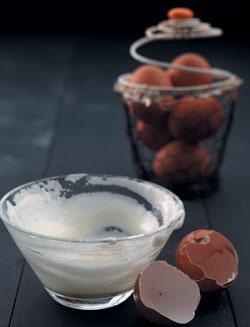How to achieve simple egg-cellence…
How to make meringues
Meringues are made by gradually mixing castor sugar into beaten egg whites. For hard meringues (macaroons) use 1 large egg white to 50g sugar. For soft meringues (tarts and puddings) use 1 large egg white to 25g sugar.
- Eggs should be at room temperature and utensils should be clean and dry.
- Whisk large egg whites in a clean bowl until very thick.
- Gradually whisk in the castor sugar and beat until stiff.
- Bake on a low heat, about 150°C, near the top of the oven.
How to poach an egg
Gently heat a saucepan of water with a little vinegar to just below boiling point. The water should be rolling gently but not bubbling. Crack the egg into a cup to check for freshness, then swirl the water with a fork as you gently drop the egg in. With a slotted spoon, carefully bring the egg white together over the egg yolk and cook for about a minute, depending on how you like your eggs. Remove with a slotted spoon and serve.
How to make mayonnaise
Wash the eggs first and use 2 large egg yolks to 300ml oil and 30ml (2 tbsp) lemon juice. To make aïoli, add crushed garlic after making the mayonnaise.
- Using an electric mixer, beat the yolks with a pinch of salt until very thick.
- Add the oil in a thin, steady stream, beating continuously until the mayonnaise is smooth and creamy. If oil is added too quickly to combine, the mixture will either curdle or be runny. If it curdles, place a freshegg yolk in a clean bowl and whisk well, then gradually add the curdled mixture, beating vigorously until each addition is incorporated before adding more.
- Add the lemon juice and beat until the mixture turns pale. Adjust the salt.
- Store mayonnaise in an airtight container in the fridge for no more than five days.
Tips for good eggs
- To check if an egg is fresh, submerge it in a glass of water: a stale egg will float vertically, while a fresh egg will lie horizontally on the bottom of the glass.
- Eggs are porous, so keep them in their carton in the fridge to prevent them from absorbing odours (but for a great truffle omelette, store eggs in a basket with a truffle).
- Always use the egg size specified in a recipe.
- Bring eggs to room temperature before use (cold eggs will not whisk well or emulsify and will crack in boiling water).
- Add a beaten egg to thicken soups, stews and sauces.
- When deep-frying, dip crumbed items into beaten egg to keep their coating in place as well as to prevent the food from absorbing the oil.
- For a golden sheen on pastries, brush them with beaten egg before baking.

